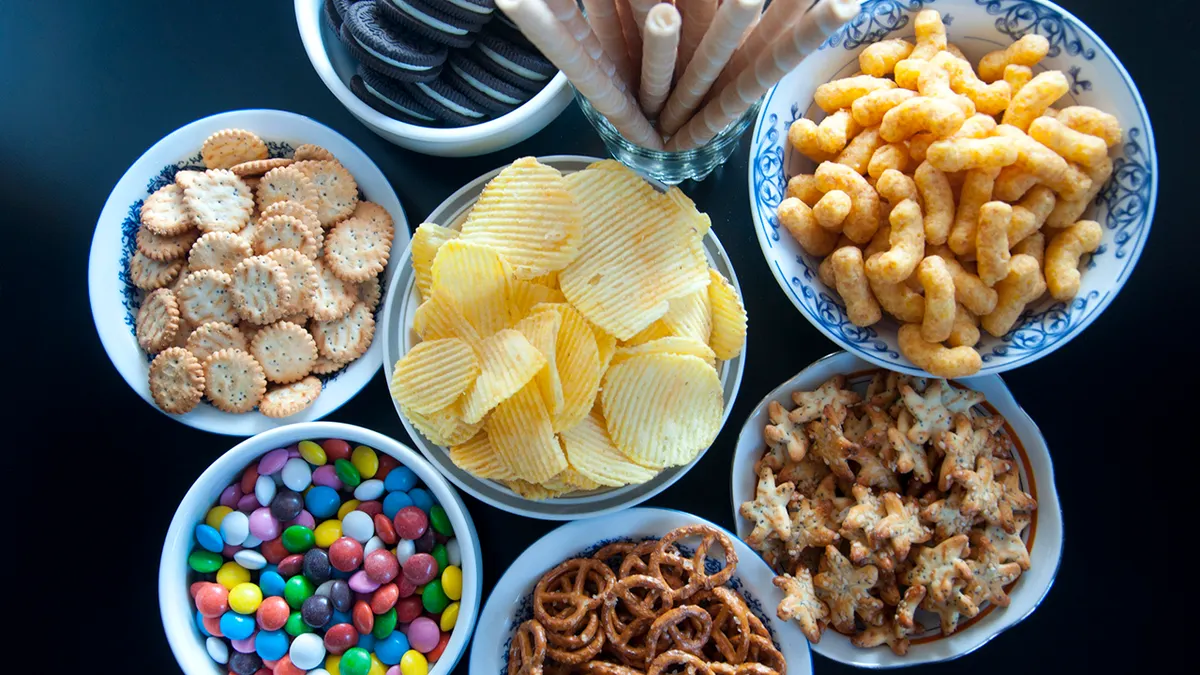

Super-processed packaged foods have become prevalent in U.S. diets — and experts are warning of the potential effects.
Recent research has shown that 60% of Americans' daily caloric intake comes from ultra-processed foods (UPFs).
A study published by the BMJ revealed that exposure to UPFs was associated with 32 poor health outcomes, including mental, respiratory, cardiovascular, gastrointestinal and metabolic complications.
THESE 6 ‘HEALTHY’ FOODS WON'T HELP YOU LOST WEIGHT, NUTRITIONIST WARNS
Some of the linked conditions include cancer, heart disease, metabolic syndrome, non-alcoholic fatty liver disease and type 2 diabetes.
While America’s diet is 60% ultra-processed overall, registered dietitian nutritionist Ilana Muhlstein warned that consumption among American kids is even higher than that.

"With children, it’s actually over 70%," the Los Angeles-based expert told Fox News Digital. "That is really wild when you think about it."
She added, "What we eat defines how our cells work, how our organs work, and we're seeing a strong decline in mental health and well-being."
Muhlstein said people are not consuming the vitamins, minerals or healthy fat sources as previous generations did.
LEAN, MEAN PROTEIN: HOW MUCH SHOULD YOU BE EATING? NUTRITIONIST REVEALS ANSWERS
Instead, today’s kids are ingesting "plenty of fat" that comes from ultra-processed seed oils, fried foods and sugary foods, she said.
"We’re actually seeing that this next generation might be the first generation to … have a shorter lifespan than their parents due to nutrition and lifestyle factors," Muhlstein said.

Studies have shown that providing children with a nutritious diet improves their mental well-being, behavior and academic achievement, noted Muhlstein, who teaches a kids' nutrition course called "Raising Balanced Eaters."
The goal isn't necessarily to get to 0% ultra-processed foods, Muhlstein noted, as that would likely be unrealistic.
2 SURPRISING FOODS FOR FALL THAT ARE DELICIOUS, HEALTHY AND EASY TO PREPARE
"But right now, if we're seeing that kids are eating about 70% ultra-processed foods and only 30% of their calories are coming from whole foods, the goal would be to reverse that."
The nutritionist encouraged parents to follow the "80/20 rule" when feeding their kids, which would include 80% of whole foods like eggs, fish, meat, fruits and vegetables, and 20% of not-so-nutritious foods like chips, cookies and ice cream.
Muhlstein listed a few alternatives for ultra-processed foods that are popular with kids.
This includes using marinara sauce instead of ketchup on foods like chicken nuggets and French fries.
TO SIGN UP FOR OUR HEALTH NEWSLETTER
"[Marinara] has fewer ingredients [and is] much lower in sugar," she said. "You actually see chunks of tomato, some basil, maybe it’s made with some olive oil or another healthy oil and some salt."

"It’s still creamy, it’s still red, it’s still tasty, and it’s one step closer to less processing."
For popular processed foods like chicken nuggets, which have been "all blended up and mechanically separated," Muhlstein suggested switching to chicken strips and gradually moving toward baked rather than fried.
Even at a barbecue, the expert recommended the simple, healthier decision of choosing a hamburger over a hot dog.
DRINKING SOY MILK COULD REDUCE RISK FACTORS FOR HEART DISEASE, RESEARCH SHOWS
"Hot dogs are usually made with nitrites and nitrates," she cautioned. "We actually have incredible research to show that they increase the risk of certain cancers."
"When you can go from a hot dog to a hamburger, that's usually just ground beef … with some seasoning," the expert went on. "It's already a nice step in the right direction of less processing overall."

She encouraged parents to take these transitions "one step at a time" and to "be really joyful" about the experience to boost their child’s attitude.
Failing to address a child’s eating habits and assuming they might "grow out of it" could cause long-term consequences, she warned.
For more Health articles, visit www.foxnews/health
"If you're not exposing your kids to flavors and textures beyond chicken nuggets, sugary yogurts, French fries, hot dogs and pizza, it's very unlikely that they are going to establish a better palate and a healthier relationship with food moving forward."

The expert recommended sitting down for family meals, noting that it’s one of the most "well-researched" ways to reduce eating disorders.
This includes turning off the TV and electronics during dinner, she said, as studies show TV-watching during meals leads to higher consumption of UPFs.
"Only three to five family meals a week can lower a person's risk for eating disorders," she said. "It's [proven] to bring a healthy, positive relationship around food, especially if you can make the conversations lighthearted … keep it somewhat positive."
She also said, "It's a great way for the family to connect, for the kids to see their parents eat a wholesome meal, and for everyone to return to more meals and less mindless snacking."


